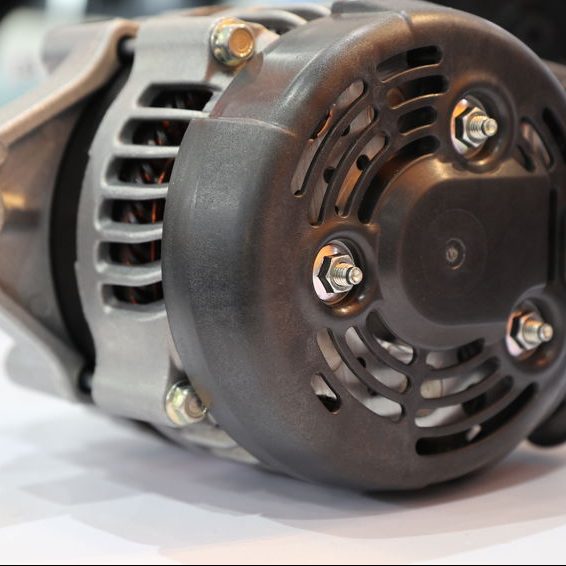
Alternator Failure
Car trouble stinks. There’s not much worse than a breakdown. They always seem to come at the worst possible moments. One of the most common car issues people encounter is problems with an alternator or battery. Both parts affect how a car starts and operates. Without them working properly, drivers are dead in the water. The good news is, though, that problems with an alternator and battery are easily identifiable. If it’s a battery problem, it can be solved by a quick trip to the car parts store to swap in a new one. If the problem lies with the alternator, though, car part retailers will say a mechanic’s help is required. When it comes to spotting and fixing an alternator, Lombard and Wheaton, IL has J1 Auto Repair on hand to deliver the following breakdown.
What causes alternator to fail?
An alternator provides electrical power to a vehicle’s ignition. It works in tandem with the car’s starter, battery and other parts to get a car going. Alternators generate power by spinning plates across a roll of copper wires. When an alternator breaks down, it’s because one or more components in it fail due to wear and tear. Sometimes, one of the plates fail or the alternator can’t spin well, it will still work, but voltage output is lower. When the voltage an alternator generates gets below 12 volts, it’s a good indication that the alternator is bad.
What would cause alternator to keep going bad?
Some people struggle with alternators that act up over and over. A dying battery can cause repeated alternator failure. When a car is running, the alternator recharges the battery. When a battery is on its last breath, the alternator has to work harder to push capacity back into the battery. The heavier load on the alternator can cause it to fail faster.
Poor repair work on alternator issues can also lead to ongoing troubles. Perhaps plates in the alternator continue to fail, or there’s some other fix that provides only temporary relief. Most people who try and fix a bad alternator end up wishing they’d just replaced it at the start of their worries.
Things to watch for in a bad alternator
What are the signs of a bad alternator? Thankfully, spotting problems with an alternator is simple enough. Obvious signs usually start with strange sounds. What does a bad alternator sound like? One of the most common signs of a broken alternator is loud grinding coming from under the hood. Alternators spin on a set of ball bearings and when the alternator is worn down enough, the ball bearings start to catch and clank around inside it causing a loud grinding noise.
When a car feels like its electronic systems are working right, it’s another sign of a bad alternator. Drivers may notice their headlights are dim or flickering, indicating low electrical output. Additionally, there may be some difficulty starting when the ignition is turned over. As mentioned, battery issues could be due to a faulty alternator’s inability to recharge it. If the car’s battery is relatively new, it could point to problems with the alternator.
Weird smells can also direct drivers to broken alternators. Alternators work together with engine belts to distribute power throughout the engine and keep things humming. If an alternator’s ball bearings aren’t letting it spin freely, or something else is affecting its ability to spin, then the belts have to work a lot harder. Under increased strain, the belts can heat up and the engine will start smelling like burning rubber. Usually, this problem happens because a belt is loose. A quick tightening generally solves the problem, but if it persists, then it’s likely an alternator issue.
Of course, one sure sign there’s a problem is when the ‘check engine’ indicator light comes on. A lot of car monitoring systems aren’t specific enough to pinpoint problems with a filter, alternator or some other part, but it’s a good idea to take a car in for service anytime the indicator flashes up on the dashboard.
What to do
Most of the time, alternators need to be repaired or replaced by a professional. Mechanics can usually swap out an alternator in around an hour. Even though it may be an inconvenience, it’s not a terribly expensive fix and it will be a relief the problem has been solved. The easiest way to know if it’s an alternator problem is to make sure the car battery is fully charged. If it drains quickly and dies, then it’s almost certainly a faulty alternator.
When people start noticing problems with their alternator, they wonder, “Can you jump start a car with a bad alternator?” They want to know how if they can get their car started and to the shop without having to call for a tow. Jump starting a car with a bad alternator is possible, but it takes following these steps to get the job done.
- Make sure the car jumping has a good battery.
- Connect the jumper cables.
- Start the car with the working battery and let the engine run for a few minutes.
- When enough time has passed, start the car with the bad alternator.
- Take the car directly to a mechanic shop. The battery won’t last long without a functioning alternator.
For help with an alternator, Lombard and Wheaton, IL drivers know they can turn to J1 Auto Repair. We help our clients get back on the road and back to normal life fast. For any questions about alternators in Lombard and Wheaton, IL, contact our team today at 630-932-4427.
